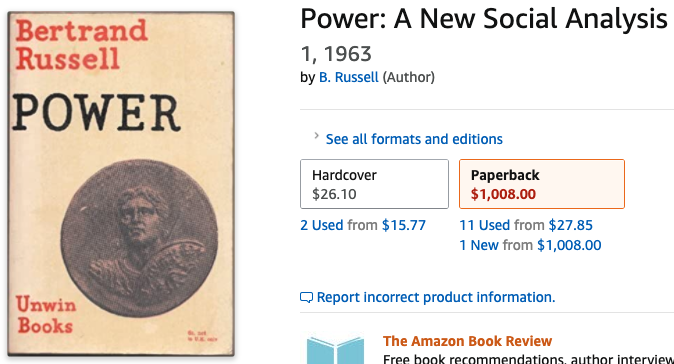Bertrand Russell on Power

Bertrand Russell on power, classifying people into types:
I have spoken hitherto of those who command and those who obey, but there is a third type, namely, those who withdraw. There are men who have the courage to refuse submission without having the imperiousness that causes the wish to command. Such men do not fit readily into the social structure and in one way or another they seek a refuge where they can enjoy a more or less solitary freedom. At times, men with this temperament have been of great historical importance ; the early Christians and the American pioneers represent two species of the genus. Sometimes the refuge is mental; sometimes physical; sometimes it demands the complete solitude of a hermitage; sometimes the social solitude of a monastery. Among mental refugees are those who belong to obscure sects, those whose interests are absorbed by innocent fads, and those who occupy themselves with recondite and unimportant forms of erudition.
2020-08-08 Wikipedia:
Power: A New Social Analysis by Bertrand Russell (1st imp. London 1938, Allen and Unwin, 328 pp.) is a work in social philosophy written by Bertrand Russell. Power, for Russell, is one's ability to achieve goals. In particular, Russell has in mind social power, that is, power over people.[1]
The volume contains a number of arguments. However, four themes have a central role in the overall work. The first theme given treatment in the analysis is that the lust for power is a part of human nature. Second, the work emphasises that there are different forms of social power, and that these forms are substantially interrelated. Third, Power insists that “organisations are usually connected with certain kinds of individuals”. Finally, the work ends by arguing that “arbitrary rulership can and should be subdued”.
Throughout the work, Russell's ambition is to develop a new method of conceiving the social sciences as a whole. For him, all topics in the social sciences are merely examinations of the different forms of power – chiefly the economic, military, cultural, and civil forms (Russell 1938:4).[2] Eventually, he hoped that social science would be robust enough to capture the “laws of social dynamics”, which would describe how and when one form of power changes into another. (Russell 1938:4–6) As a secondary goal of the work, Russell is at pains to reject single-cause accounts of social power, such as the economic determinism he attributes to Karl Marx. (Russell 1938:4, 95)[3]
Full text
https://russell-j.com/beginner/POWER1938-TEXT.HTM
- Power: A New Social Analysis
- By Bertrand Russell.
- Buy at amazon
- A History of Western Philosophy
- By Bertrand Russell.
- Buy at amazon
See also: